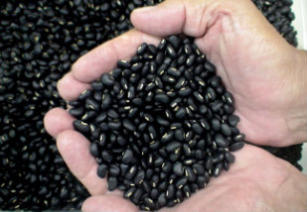Feijão-Caupi BRS Tapaihum
Cowpeas BRS Tapaihum

Photo: Ribeiro, Marcelino
BRS Tapaihum, which in the language of the Pataxó indigenous people means black, is a cowpea ( Vigna unguiculata) cultivar with black tegument for irrigated areas and upland areas in Bahia, Pernambuco and Piauí. Cowpeas are a grain species that is of historical importance in Brazil, especially in its North and Northeast. Lately the species has aroused interest in other regions of the country, especially in Cerrado areas, following the growth of the international market for this leguminous plant. The cultivar presents semi-determined growth habit and erect size at the beginning of the blooming, purple flowers, and grains with black coloration and medium brightness. It has a cycle of approximately 65 to 70 days from germination to harvest, and pods insert themselves above the foliage. In both upland or irrigated cultivation, the use of 200,000 plants per hectare is recommended. BRS Tapaihum has black-colored reniform grains and average mass of 19 grams per 100 grains, and can be used for making the typical dish known as "feijoada".
Where to find:
Lodea Consultoria e Comercio de Sementes LTDA
AV. TANCREDO NEVES Nº 1168 SALA 308 ED. SORRISO CENTER
CEP:78896005
Cidade: Sorriso
UF: MT
Telefone: 6635448627
E-mail: lcagronegocios@hotmail.com
Product: Cultivar Launch year: 2011
Country: Brazil Region: Northeast, Central-West State: Bahia, Pernambuco, Mato Grosso, Piauí Biome: Cerrado, Caatinga
Responsible Unit: Embrapa Semi-arid Region
Keywords: feijão-caupi, melhoramento genético, alimentação humana
